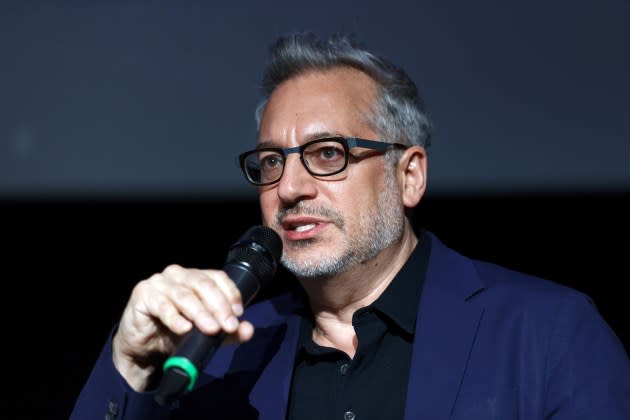Veteran TV Director Jeremy Podeswa Talks Working With Scorsese On ‘Boardwalk Empire’ And Why The “Economics Of Streaming” Never Made Sense — Thessaloniki

“We’re so f–ked. How are we gonna do that?” Veteran TV director Jeremy Podeswa said was the first reaction he and a colleague shared after seeing an early cut of Martin Scorsese’s Boardwalk Empire pilot for HBO.
“It was huge, very expensive, and took a long time to make. It took 33 days to shoot and 35 million dollars, which is a lot now, but then, it was even more.”
More from Deadline
Bill Maher Laments The Rejection Of Western Civilization Values By Misguided Social Justice Warriors
Podeswa recounted the story during a career masterclass at Greece’s Thessaloniki International Film Festival, telling the packed audience that he had been summoned to Scorsese’s personal screening room to view the episode because he’d been hired to direct a follow-up episode for the network.
“To give you a comparison, 33 days and 35 million dollars, and then I was coming to do an episode in 10 days with 10 million dollars, which also sounds like a lot of money, but it’s not 35 million,” Podeswa said.
The Canadian filmmaker said it was an “amazing experience and challenge” to find his own directorial path on Boardwalk Empire following Scorsese’s pilot, adding, “You just figure things out.”
“You can’t be Scorsese. That’s not what I’m gonna do, but somehow, it will still feel like the same show,” he said.
Shadowing Scorsese on Boardwalk Empire was just one of the anecdotes Podeswa shared during his early morning masterclass at Thessaloniki, the centerpiece of the festival’s AGORA industry sidebar.
With credits on shows such as Six Feet Under, Game Of Thrones, and The Handmaid’s Tale, Podeswa has primarily worked on TV after directing a series of features in the 80s and 90s, including, most prominently, the 1996 feature Eclipse.
“TV tends to be very quick. You don’t have a huge amount of time for rehearsal or shooting, so everything is the same as features but more compressed,” Podeswa said of the difference between working on narrative features compared to series.
Podeswa added that he tends to steer clear of traditional table reads with an entire TV cast, which he said aren’t very “useful” for him, but instead prefers to have individual meetings with actors to drill down the script’s narrative beats.
“We go through the script together and talk about what we’re thinking and if we need to make changes,” he said.
Later during the session, Podeswa was quizzed on what he thought about the current state of TV. In response, he said he believed the industry was at an “inflection point” due to the shrinking of what he described as the “pay television” model of subscription-based, appointment TV.
“As we all know, there are 10,000 shows on multiple platforms, and you can swipe through 10 million things before you find something to watch. It’s a different kind of thing, and I think it’s too much choice, which is never a good thing,” Podeswa said. “It’s very hard to get people to focus on one thing. I think Game Of Thrones is probably the last one. I can’t imagine another show where everyone is watching the same thing at the same time.”
Zeroing in directly on streamers and their prolific output, Podeswa said: “They can’t continue to produce at this rate.”
“The economics of streaming, I think they’re discovering now, as you can see with the strikes happening, that streamers got into this business fairly quickly, and the economics of it weren’t so clear at the beginning,” he said. “They can’t keep doing thousands of shows and throwing money at it. It’s not gonna sustain.”
Despite wholesale changes in the industry — which he often categorized as a negative — Podeswa concluded that truly creative TV shows continue to be produced. He twice highlighted the limited Netflix drama Beef, starring Ali Wong and Steven Yeun, during the session.
“The show is great, and it was a big success for Netflix. It was made for nothing, but it doesn’t matter. The show is so fresh and clever. It’s about creativity still, and it’s always been about creativity. The fact that the industry is shifting will never change that.”
Podeswa also heaped praise on the Hulu/BBC drama Normal People, the first Sally Rooney adaptation helmed by Irish filmmaker Lenny Abrahamson.
“It’s one of the greatest shows ever. In execution, it’s one of the most beautiful things you can ever watch.”
The Thessaloniki International Film Festival runs until November 12.
Best of Deadline
2023 Premiere Dates For New & Returning Series On Broadcast, Cable & Streaming
SAG-AFTRA Interim Agreements: Full List Of Movies And TV Series
Sign up for Deadline's Newsletter. For the latest news, follow us on Facebook, Twitter, and Instagram.

